韩素英2010翻译大赛对照版
第26届韩素音青年翻译奖大赛参赛试卷(英译汉)
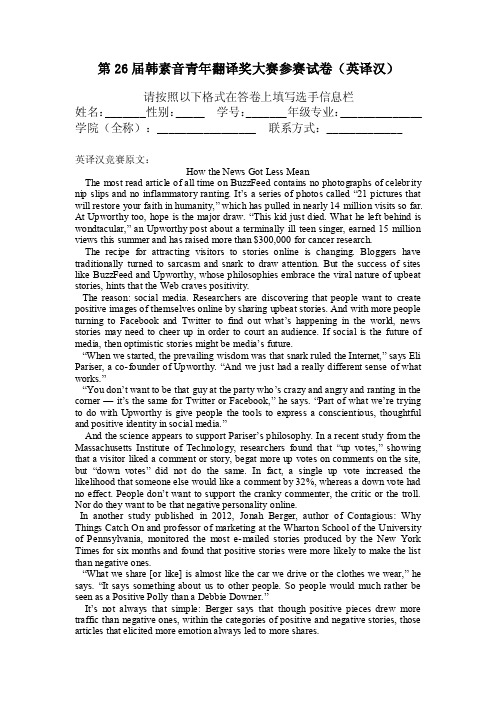
第26届韩素音青年翻译奖大赛参赛试卷(英译汉)请按照以下格式在答卷上填写选手信息栏姓名:_______性别:_____ 学号:_______年级专业:______________ 学院(全称):_________________ 联系方式:_____________英译汉竞赛原文:How the News Got Less MeanThe most read article of all time on BuzzFeed contains no photographs of celebrity nip slips and no inflammatory ranting. It’s a series of photos called “21 pictures that will restore your faith in humanity,” which has pulled in nearly 14 million visits so far. At Upworthy too, hope is the major draw. “This kid just died. What he lef t behind is wondtacular,” an Upworthy post about a terminally ill teen singer, earned 15 million views this summer and has raised more than $300,000 for cancer research.The recipe for attracting visitors to stories online is changing. Bloggers have traditionally turned to sarcasm and snark to draw attention. But the success of sites like BuzzFeed and Upworthy, whose philosophies embrace the viral nature of upbeat stories, hints that the Web craves positivity.The reason: social media. Researchers are discovering that people want to create positive images of themselves online by sharing upbeat stories. And with more people turning to Facebook and Twitter to find out what’s happening in the world, news stories may need to cheer up in order to court an audience. If social is the future of media, then optimistic stories might be media’s future.“When we started, the prevailing wisdom was that snark ruled the Internet,” says Eli Pariser, a co-founder of Upworthy. “And we just had a really different sense of what works.”“You don’t want to be that guy at the party who’s crazy and angry and ranting in the corner —it’s the same for Twitter or Facebook,” he says. “Part of what we’re trying to do with Upworthy is give people the tools to express a conscientious, thoughtful and positive identity in social media.”And the science appears to support Pariser’s philosophy. In a recent study from the Massachusetts Institute of Technology, researchers found that “up votes,” showing that a visitor liked a comment or story, begat more up votes on comments on the site, but “down votes” did not do the same. In fact, a single up vote increased the likelihood that someone else would like a comment by 32%, whereas a down vote had no effect. People don’t want to support the cranky commenter, the critic or the troll. Nor do they want to be that negative personality online.In another study published in 2012, Jonah Berger, author of Contagious: Why Things Catch On and professor of marketing at the Wharton School of the University of Pennsylvania, monitored the most e-mailed stories produced by the New York Times for six months and found that positive stories were more likely to make the list than negative ones.“What we share [or like] is almost like the car we drive or the clothes we wear,” he says. “It says something about us to other people. So people would much rather be seen as a Positive Polly than a Debbie Downer.”It’s not always that simple: Berger says that though positive pieces drew more traffic than negative ones, within the categories of positive and negative stories, those articles that elicited more emotion always led to more shares.“Take two negative emotions, for example: anger and sadness,” Berger says. “Both of those emotions would make the reader feel bad. But anger, a high arousal emotion, leads to more sharing, whereas sadness, a low arousal emotion, doesn’t. The same is true of the positive side: excitement and humor increase sharing, whereas contentment decreases sharing.”And while some popular BuzzFeed posts —like the recent “Is this the most embarrassing interview Fox News has ever done?” —might do their best to elicit shares through anger, both BuzzFeed and Upworthy recognize that their main success lies in creating positive viral material.“It’s not that people don’t share negative stories,” says Jack Shepherd, editorial director at BuzzFeed. “It just means that there’s a higher potential for positive stories to do well.”Upworthy’s mission is to highlight serious issues but in a hopeful way, encouraging readers to donate money, join organizations and take action. The strategy seems to be working: barely two years after its launch date (in March 2012), the site now boasts 30 million unique visitors per month, according to Upwort hy. The site’s average monthly unique visitors grew to 14 million people over its first six quarters — to put that in perspective, the Huffington Post had only about 2 million visitors in its first six quarters online.But Upworthy measures the success of a story not just by hits. The creators of the site only consider a post a success if it’s also shared frequently on social media. “We are interested in content that people want to share partly for pragmatic reasons,” Pariser says. “If you don’t have a g ood theory about how to appear in Facebook and Twitter, then you may disappear.”Nobody has mastered the ability to make a story go viral like BuzzFeed. The site, which began in 2006 as a lab to figure out what people share online, has used what it’s le arned to draw 60 million monthly unique visitors, according to BuzzFeed. (Most of that traffic comes from social-networking sites, driving readers toward BuzzFeed’s mix of cute animal photos and hard news.) By comparison the New York Times website, one of the most popular newspaper sites on the Web, courts only 29 million unique visitors each month, according to the Times.BuzzFeed editors have found that people do still read negative or critical stories, they just aren’t the posts they share with their friends. And those shareable posts are the ones that newsrooms increasingly prize.“Anecdotally, I can tell you people are just as likely to click on negative stories as they are to click on positive ones,” says Shepherd. “But they’re more likely to sh are positive stories. What you’re interested in is different from what you want your friends to see what you’re interested in.”So as newsrooms re-evaluate how they can draw readers and elicit more shares on Twitter and Facebook, they may look to BuzzFe ed’s and Upworthy’s happiness model for direction.“I think that the Web is only becoming more social,” Shepherd says. “We’re at a point where readers are your publishers. If news sites aren’t thinking about what it would mean for someone to share a story on social media, that coul be detrimental.”PS:1.请各位参赛选手关注我们的新浪微博:@安徽师范大学翻译协会2014,和腾讯微博:@安徽师范大学译协。
2010年广西翻译大赛-决赛卷-及参考译文

2010年“东方正龙杯”第二届广西翻译大赛(决赛卷)(2010年12月5日13:00—14:00)院校名称:系别/专业:姓名:参赛座位号:总分:参赛注意事项:一、12:50入场完毕;比赛时间一个小时,即13:00至14:00;二、入场后严格按照监考老师安排的座位坐下;三、不许携带和翻看任何形式的词典或其他工具书和参考书籍;四、严格遵守考场纪律,不许交头接耳,不许偷看抄袭他人答案;五、需用圆珠笔或钢笔来答题,尽可能书写清晰、整齐;六、参赛选手答题完毕或比赛时间结束时须上交赛卷,不许带走赛卷;七、凡严重违反考场纪律者被取消参赛资格。
Part I Passage Translation from English into Chinese(60%) Direction: Translate the Following Passage into ChineseNight after night, she came to tuck me in, even long after my childhood years. Following her longstanding custom, she'd lean down and push my long hair out of the way, then kiss my forehead.I don't remember when it first started annoying me — her hands pushing my hair that way. But it did annoy me, for they felt work-worn and rough against my young skin. Finally, one night, I shouted out at her, "Don't do that anymore —your hands are too rough!" She didn't say anything in reply. But never again did my mother close out my day with that familiar expression of her love.Time after time, with the passing years, my thoughts returned to that night. By then I missed my mother's hands, missed her goodnight kiss on my forehead. Sometimes the incident seemed very close, sometimes far away. But always it lurked, in the back of my mind.Well, the years have passed, and I'm not a little girl anymore. Mom is in her mid-seventies, and those hands I once thought to be so rough are still doing things for me and my family. She's been our doctor, reaching into a medicine cabinet for the remedy to calm a young girl's stomach or soothe the boy's scraped knee. She cooks the best fried chicken in the world... gets stains out of blue jeans like I never could...Now, my own children are grown and gone. Mom no longer has Dad, and on special occasions, I find myself drawn next door to spend the night with her. So it was late on Thanksgiving Eve, as I slept in the bedroom of my youth, a familiar hand hesitantly run across my face to brush the hair from my forehead. Then a kiss, ever so gently, touched my brow.In my memory, for the thousandth time, I recalled the night my young voice complained, "Don't do that anymore —your hands are too rough!" Catching Mom's hand in hand, I blurted out how sorry I was for that night. I thought she'd remember, as I did. But Mom didn't know what I was talking about. She had forgotten — and forgiven — long ago.That night, I fell asleep with a new appreciation for my gentle mother and her caring hands. And the guilt that I had carried around for so long was nowhere to be found.Translation:每一夜,母亲都来为我盖被,甚至在我长大之后也如此。
韩素音翻译大赛beyond life曹明伦中译版本归化策略赏析

韩素音翻译大赛beyond life曹明伦中译版本归化策略赏析韩素音翻译大赛的BeyondLife曹明伦中译版本是一部出色的文
本翻译作品,也是本次翻译大赛中表现卓越的文本翻译作品之一。
曹明伦出色的文本翻译最终决定了他在本次比赛中获胜,他所采用的归化策略也是值得学习之处。
首先,曹明伦在翻译Beyond Life充分考虑了传统文化层面,他认为一般的文本翻译无法完全贴近原作,应该依据不同的文化背景考虑翻译的文本结构、语言词汇选择和表达方式。
因此,曹明伦在每一句翻译时都尽量把文本的原意充分表达出来,而不是迎合某一种语言文化。
他也在翻译文章时充分考虑了当代语言文化中的一些特殊动态,如换用一些更受欢迎的词汇,以及增添一些当代文化内容,这样翻译出来的文本才能更具有可读性。
其次,曹明伦在翻译文本时也考虑到读者的感受,他认为读者对每一段的理解和接受程度至关重要,因此他在每一段的翻译中始终着重强调结构和表达上的巧妙,以使读者能够准确的理解文本的内容。
此外,他还在句子的结构和表达上制造出一定的张力和情感,以便读者能更好的体验文本带来的乐趣和感受。
同时,曹明伦还注重翻译文本的语言准确性,他坚持在翻译中尽可能保持原文的内容,但又不会让原文太过直接,他会通过一些词汇的变化来使翻译的文本更加流畅,表达也更加精准。
总之,曹明伦翻译Beyond Life的成功归功于他在翻译过程中所采用的传统文化、当代文化、读者体验和语言准确性等策略,他通过
这些策略,使得原文的意义不仅表达清晰,而且具有一定的文化熏陶和深度,获得了翻译大赛的金奖。
因此,翻译工作者在进行文本翻译时,也应当借鉴曹明伦的翻译策略,以更为完美地表达原文的内容和意义。
第25届韩素音翻译大赛汉翻英参考
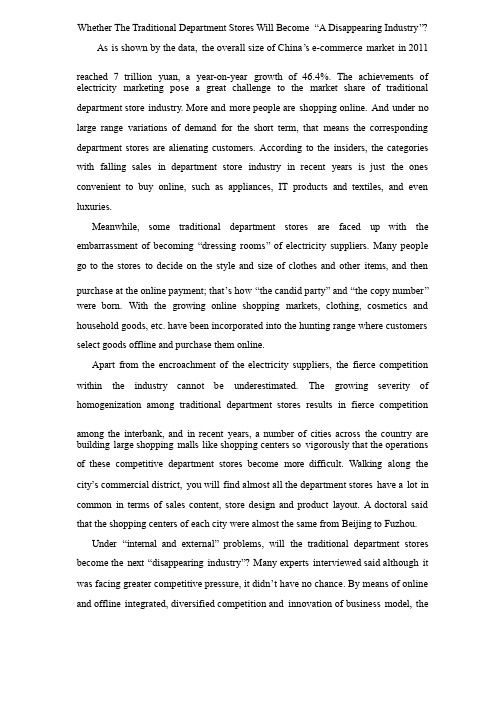
Whether The Traditional Department Stores Will Become “A Disappearing Industry A Disappearing Industry””?As is shown by the data, the overall size of China the overall size of China’’s e-commerce market in 2011 reached 7 trillion yuan, a year-on-year growth of 46.4%. The achievements of electricity marketing pose a great challenge to the market share of traditional department store industry industry. More and . More and more people are shopping online. And under no large range variations of demand for the short term, that means the corresponding department stores are alienating customers. According to the insiders, the categories with falling sales in department store industry in recent years is just the ones convenient to buy online, such as appliances, IT products and textiles, and even luxuries.Meanwhile, some traditional department stores are faced up with the embarrassment of becoming “dressing rooms rooms””of electricity suppliers. Many people go to the stores to decide on the style and size of clothes and other items, and then purchase at the online payment; that purchase at the online payment; that’’s how s how ““the candid party the candid party”” and and ““the copy number the copy number”” were born. With the growing online shopping markets, clothing, cosmetics and household goods, etc. have been incorporated into the hunting range where customers select goods offline and purchase them online.Apart from the encroachment of the electricity suppliers, the fierce competition within the industry cannot be underestimated. The growing severity of homogenization among traditional department stores results in fierce competition among the interbank, and in recent years, a number of cities across the country are building large shopping malls like shopping centers so vigorously that the operations of these competitive department stores become more difficult. Walking along the city city’’s commercial district, you will find almost all the department stores have a lot in common in terms of sales content, store design and product layout. A doctoral said that the shopping centers of each city were almost the same from Beijing to Fuzhou.Under “internal and external external””problems, will the traditional department stores become the next “disappearing industry industry”?”?Many experts interviewed said although it was facing greater competitive pressure, it didn was facing greater competitive pressure, it didn’’t have no chance. By means of online and offline integrated, diversified competition and innovation of business model, thedepartment store industry may achieve the success of “counter-attackcounter-attack””.electronic shock”” are As is informed, the department stores that have experienced “electronic shock minority. . Large department stores in Beijing have built their online not in the minoritye-commerce platforms. The e-commerce in Tianjin Department Store is now under plan of implement.At the same time, department stores should take the path of multi-position management and differentiated marketing, aiming at the targeted customer segments.A doctoral tutor emphasized that in spite of the more severe business environment the department stores had faced in recent years and the more fierce competition among electricity suppliers and large-scale commercial complexes, customer segments of the department stores were just billabong in a part. Department stores should pay more attention to the customer segments they own now, improve after-sale service and explore the personalized service for their customers.In addition, traditional department stores should take advantage of the momentum of development in shopping centers to transform. It It’’s understood that there exist certain corresponding patterns in the structures of the retail industry and per capita GDP. General merchandise stores dominate the market when per capita GDP ranges from $3,000 to $5,000 while shopping centers exclusive shops, specialty stores and convenience stores play a leading role when per capita GDP ranges from $5,000 to $10,000. However, the per capita GDP of our country has risen to more than $5,000 in 2011, so traditional department stores can be directed to the transformation to shopping centers at this time.。
第十七届“韩素音青年翻译奖”赛(汉译英)中文原文及参考译文和解析
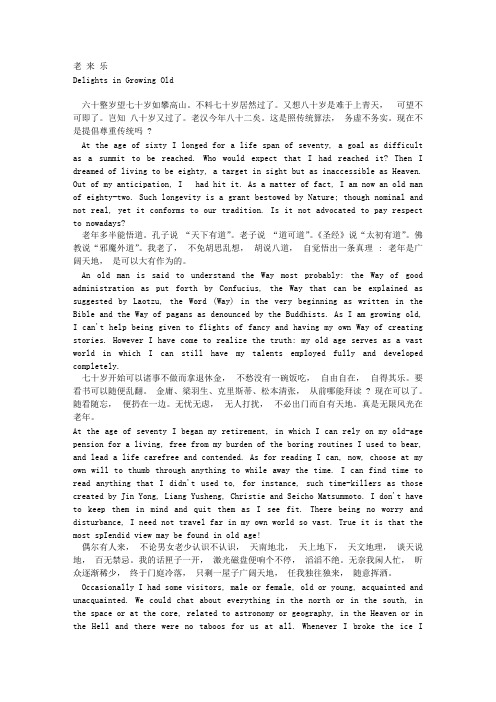
老来乐Delights in Growing Old六十整岁望七十岁如攀高山。
不料七十岁居然过了。
又想八十岁是难于上青天,可望不可即了。
岂知八十岁又过了。
老汉今年八十二矣。
这是照传统算法,务虚不务实。
现在不是提倡尊重传统吗 ?At the age of sixty I longed for a life span of seventy, a goal as difficult as a summit to be reached. Who would expect that I had reached it? Then I dreamed of living to be eighty, a target in sight but as inaccessible as Heaven. Out of my anticipation, I had hit it. As a matter of fact, I am now an old man of eighty-two. Such longevity is a grant bestowed by Nature; though nominal and not real, yet it conforms to our tradition. Is it not advocated to pay respect to nowadays?老年多半能悟道。
孔子说 “天下有道”。
老子说 “道可道”。
《圣经》说“太初有道”。
佛教说“邪魔外道”。
我老了,不免胡思乱想,胡说八道,自觉悟出一条真理 : 老年是广阔天地,是可以大有作为的。
An old man is said to understand the Way most probably: the Way of good administration as put forth by Confucius, the Way that can be explained as suggested by Laotzu, the Word (Way) in the very beginning as written in the Bible and the Way of pagans as denounced by the Buddhists. As I am growing old, I can't help being given to flights of fancy and having my own Way of creating stories. However I have come to realize the truth: my old age serves as a vast world in which I can still have my talents employed fully and developed completely.七十岁开始可以诸事不做而拿退休金,不愁没有一碗饭吃,自由自在,自得其乐。
韩素音翻译大赛
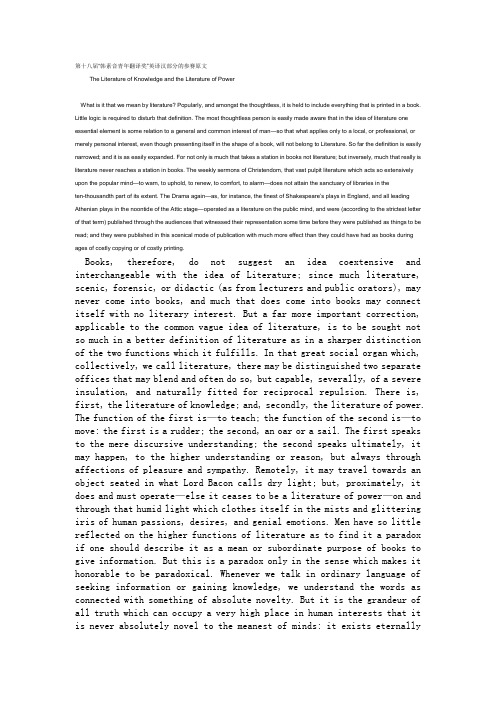
第十八届“韩素音青年翻译奖”英译汉部分的参赛原文The Literature of Knowledge and the Literature of PowerWhat is it that we mean by literature? Popularly, and amongst the thoughtless, it is held to include everything that is printed in a book. Little logic is required to disturb that definition. The most thoughtless person is easily made aware that in the idea of literature one essential element is some relation to a general and common interest of man—so that what applies only to a local, or professional, or merely personal interest, even though presenting itself in the shape of a book, will not belong to Literature. So far the definition is easily narrowed; and it is as easily expanded. For not only is much that takes a station in books not literature; but inversely, much that really is literature never reaches a station in books. The weekly sermons of Christendom, that vast pulpit literature which acts so extensivelyupon the popular mind—to warn, to uphold, to renew, to comfort, to alarm—does not attain the sanctuary of libraries in theten-thousandth part of its extent. The Drama again—as, for instance, the finest of Shakespeare’s plays in England, and all leading Athenian plays in the noontide of the Attic stage—operated as a literature on the public mind, and were (according to the strictest letterof that term) published through the audiences that witnessed their representation some time before they were published as things to be read; and they were published in this scenical mode of publication with much more effect than they could have had as books duringages of costly copying or of costly printing.Books, therefore, do not suggest an idea coextensive and interchangeable with the idea of Literature; since much literature, scenic, forensic, or didactic (as from lecturers and public orators), may never come into books, and much that does come into books may connect itself with no literary interest. But a far more important correction, applicable to the common vague idea of literature, is to be sought not so much in a better definition of literature as in a sharper distinction of the two functions which it fulfills. In that great social organ which, collectively, we call literature, there may be distinguished two separate offices that may blend and often do so, but capable, severally, of a severe insulation, and naturally fitted for reciprocal repulsion. There is, first, the literature of knowledge; and, secondly, the literature of power. The function of the first is—to teach; the function of the second is—to move: the first is a rudder; the second, an oar or a sail. The first speaks to the mere discursive understanding; the second speaks ultimately, it may happen, to the higher understanding or reason, but always through affections of pleasure and sympathy. Remotely, it may travel towards an object seated in what Lord Bacon calls dry light; but, proximately, it does and must operate—else it ceases to be a literature of power—on and through that humid light which clothes itself in the mists and glittering iris of human passions, desires, and genial emotions. Men have so little reflected on the higher functions of literature as to find it a paradox if one should describe it as a mean or subordinate purpose of books to give information. But this is a paradox only in the sense which makes it honorable to be paradoxical. Whenever we talk in ordinary language of seeking information or gaining knowledge, we understand the words as connected with something of absolute novelty. But it is the grandeur of all truth which can occupy a very high place in human interests that it is never absolutely novel to the meanest of minds: it exists eternallyby way of germ or latent principle in the lowest as in the highest, needing to be developed, but never to be planted. To be capable of transplantation is the immediate criterion of a truth that ranges on a lower scale. Besides which, there is a rarer thing than truth—namely, power, or deep sympathy with truth. What is the effect, for instance, upon society, of children? By the pity, by the tenderness, and by the peculiar modes of admiration, which connect themselves with the helplessness, with the innocence, and with the simplicity of children, not only are the primal affections strengthened and continually renewed, but the qualities which are dearest in the sight of heaven—the frailty, for instance, which appeals to forbearance, the innocence which symbolizes the heavenly, and the simplicity which is most alien from the worldly—are kept up in perpetual remembrance, and their ideals are continually refreshed. A purpose of the same nature is answered by the higher literature, viz. the literature of power. What do you learn from Paradise Lost? Nothing at all. What do you learn from a cookery book? Something new, something that you did not know before, in every paragraph. But would you therefore put the wretched cookery book on a higher level of estimation than the divine poem? What you owe to Milton is not any knowledge, of which a million separate items are still but a million of advancing steps on the same earthly level; what you owe is power—that is, exercise and expansion to your own latent capacity of sympathy with the infinite, where every pulse and each separate influx is a step upwards, a step ascending as upon a Jacob’s ladder from earth to mysterious altitudes above the earth. All the steps of knowledge, from first to last, carry you further on the same plane, but could never raise you one foot above your ancient level of earth: whereas the very first step in power is a flight—is an ascending movement into another element where earth is forgotten.。
以2010英译汉为例解析专八翻译

and no living creature was to be seen, excepting that in the green church-yard there were cattle tranquilly reposing upon the verdant graves, and particularly round about the grave of a child whom I had tenderly loved, just as I had really beheld them, a little before sunrise, in the same 参考译文一:四周看不见任何生物,唯有苍翠的墓地里,牛群静静地卧 Hint: 1. living creature本指“生物”,但前文描绘了玫瑰和 躺在那片郁郁葱葱的墓地上休息,好几头围绕着一个我曾深爱过的小孩 summer, when that child died.
I thought that it was a Sunday morning in May; that it was Easter Sunday, and as yet very early in the morning. Hint:1. “thought” 不宜翻译为“认为”,因为它在文中是表
示“回想起、回忆起”
杨自伍是我爸爸 参考译文版本二:
我想那是五月的一个周日的早晨;那天是复活节,一个大清 早上。我站在自家小屋的门口。就在我的面前展现出了那么 一番景色,从我那个位置其实能够尽收眼底,可是梦里的感 觉往往如此,由于梦幻的力量,这番景象显得超凡出尘,一 派肃穆气象。群山形状相同,其山脚下都有着同样可爱的山 谷;不过群山挺然参天,高于阿尔卑斯峰,诸山相距空旷, 丰草如茵,林地开阔,错落其间;树篱上的白玫瑰娟娟弥望; 远近看不见任何生物,唯有苍翠的教堂庭院里,牛群静静地 卧躺在那片郁郁葱葱的墓地歇息,好几头围绕着一个小孩的 坟墓。我曾对她一腔柔情,那年夏天是在旭日东升的前一刻, 那孩子死去了,我如同当年那样望着牛群。
第22届韩素音翻译大赛 英译汉 参考译文
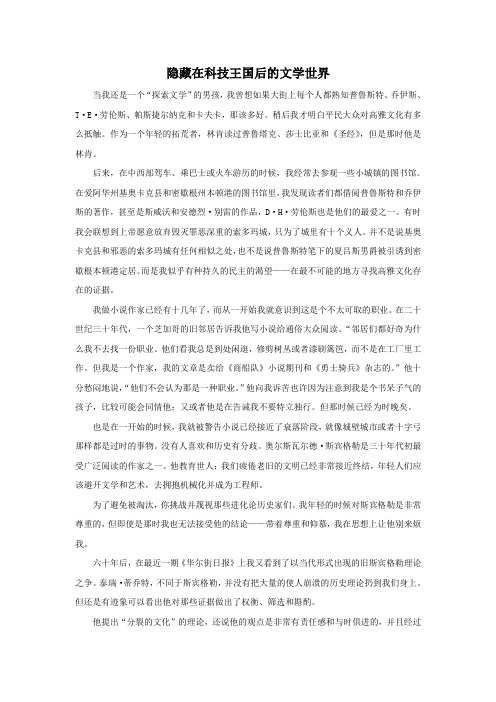
隐藏在科技王国后的文学世界当我还是一个“探索文学”的男孩,我曾想如果大街上每个人都熟知普鲁斯特、乔伊斯、T·E·劳伦斯、帕斯捷尔纳克和卡夫卡,那该多好。
稍后我才明白平民大众对高雅文化有多么抵触。
作为一个年轻的拓荒者,林肯读过普鲁塔克、莎士比亚和《圣经》,但是那时他是林肯。
后来,在中西部驾车、乘巴士或火车游历的时候,我经常去参观一些小城镇的图书馆。
在爱阿华州基奥卡克县和密歇根州本顿港的图书馆里,我发现读者们都借阅普鲁斯特和乔伊斯的著作,甚至是斯威沃和安德烈·别雷的作品,D·H·劳伦斯也是他们的最爱之一。
有时我会联想到上帝愿意放弃毁灭罪恶深重的索多玛城,只为了城里有十个义人。
并不是说基奥卡克县和邪恶的索多玛城有任何相似之处,也不是说普鲁斯特笔下的夏吕斯男爵被引诱到密歇根本顿港定居。
而是我似乎有种持久的民主的渴望——在最不可能的地方寻找高雅文化存在的证据。
我做小说作家已经有十几年了,而从一开始我就意识到这是个不太可取的职业。
在二十世纪三十年代,一个芝加哥的旧邻居告诉我他写小说给通俗大众阅读。
“邻居们都好奇为什么我不去找一份职业。
他们看我总是到处闲逛,修剪树丛或者漆刷篱笆,而不是在工厂里工作。
但我是一个作家,我的文章是卖给《商船队》小说期刊和《勇士骑兵》杂志的。
”他十分愁闷地说,“他们不会认为那是一种职业。
”他向我诉苦也许因为注意到我是个书呆子气的孩子,比较可能会同情他;又或者他是在告诫我不要特立独行。
但那时候已经为时晚矣。
也是在一开始的时候,我就被警告小说已经接近了衰落阶段,就像城壁城市或者十字弓那样都是过时的事物。
没有人喜欢和历史有分歧。
奥尔斯瓦尔德·斯宾格勒是三十年代初最受广泛阅读的作家之一。
他教育世人:我们疲倦老旧的文明已经非常接近终结,年轻人们应该避开文学和艺术,去拥抱机械化并成为工程师。
为了避免被淘汰,你挑战并蔑视那些进化论历史家们。
- 1、下载文档前请自行甄别文档内容的完整性,平台不提供额外的编辑、内容补充、找答案等附加服务。
- 2、"仅部分预览"的文档,不可在线预览部分如存在完整性等问题,可反馈申请退款(可完整预览的文档不适用该条件!)。
- 3、如文档侵犯您的权益,请联系客服反馈,我们会尽快为您处理(人工客服工作时间:9:00-18:30)。
科技帝国的背后——文坛 当我还是一个 “探索文学”的懵懂少年时,就常常想,要是大街上的每一个人都熟悉普鲁斯特和乔伊斯,劳伦斯或帕斯捷尔纳克和卡夫卡,那该多好啊! 后来,我才明白,民众其实是多么排斥高雅文化啊。 林肯年轻还在边疆拓荒时,就阅读了希腊历史学家普卢塔克和
莎士比亚的作品,还读过《圣经》。 可他还是林肯啊。 后来,每当我驾车、搭公交和乘火车到美国中西部旅游时,我都会按惯例光顾当地的小镇图书馆,结果发现爱荷华州基奥卡克市或密歇根州本顿港市的读者竟然借阅普鲁斯特、乔伊斯、甚至还有斯维沃或安德烈·别利等的作品。还有劳伦斯也是他们最喜爱的作家。 有
时,我还会想起,上帝之所以愿意赦免所多玛城,那是因为那里毕竟还能找出十个义人1。 这并非说基奥卡克市就像邪恶的所多玛城,也不是说普鲁斯特书中的黑暗男爵夏吕斯乐而忘返地想定居密歇根州本顿港。我的愿望似乎很执着,但也很普通,那就是在最不可能出现的地
方找到高雅文化的蛛丝马迹。 迄今为止,我写小说也有几十年了;从一开始,我就知道写小说并不是一项可靠的职业。 20世纪30年代,在芝加哥,一位上了年纪的邻居跟我说,他曾给一家低俗杂志写过小说。 “街坊邻居都纳闷为什么我不找份正正当当的工作,而是东游西荡,替人剪灌木,漆栏栅,怎么就不在工厂里好好上班呢。 可我是搞写作的啊。 我把小说卖给户外探险杂志《商船队》和科幻杂志《萨维齐博士》,”他有点忧伤地说, “他们可不会把写小说当成正当职业。” 大概他觉得我有点书生气,兴许跟他意气相投;也许他是在试图警告我,不要太标新立异。 但这一切都太晚了。
从一开始,也有人就警告我,说,小说已频临灭亡边缘,就好比城寨与弓弩,已是明日黄花。 况且谁都不愿意去逆转历史的车轮。 奥斯瓦尔德·施本格勒2,30年代早期德国最受
欢迎的作家之一,曾鼓吹说,我们古老的文明已经凋谢,濒临灭亡。 他告诫青年一代要避
1 义人:言行符合正义或道德标准的人。《墨子·非命上》:“义人在上,天下必治。”
2Oswald Spengler,德国哲学家。我国译界有多种译法,此处采用大英百科全书中文版译法:奥斯瓦尔德·施
本格勒。 谈文学,避谈艺术,而应热爱机械化,争当工程师。 要紧跟时代,你就要挑战和藐视那些历史进化论学者。 年少时,我就对施本格勒满怀敬意,即使如此,我还是无法接受他的观点,心里(虽然怀着恭敬和钦佩之情)还是说,滚你的蛋吧,施本格勒。
六十年后,在最近一期的《华尔街日报》上,我偶然看到一场以当代的形式而进行了一场古老的施本格勒式辩论。 与施本格勒不同的是,泰瑞·迪奇奥特并未把大量麻痹人的历史理论传输给我们,但种种迹象表明,他斟酌、审查并权衡过这些证据。 论及“雾化文化”,他的观点合理可靠,与时俱进,深思熟虑。 论及“艺术形式即科学技术”, 他告诉我们说,不久的将来,电影将会是“可下载”的,也就是说,电影可以从一台电脑转存到另外一台电脑,并且预言说,电影在不久的将来就会像书一样销售。 他预测说,科学技术的魔力神乎其神,正引领我们踏入新纪元,并断定“果真如此的话,我想,独立的电影必将取代小说,成为21世纪严肃叙事故事的最重要的媒介。”
迪奇奥特先生用图书销售数量的恶性下滑而影院入座率大幅增加的事实来支持自己的论点。 “对于三十岁以下的美国人来说,电影已经取代了小说,并成了势不可挡的艺术表
现形式。” 对此,迪奇奥特先生补充道,像汤姆·克兰西3和史蒂芬·金4这些畅销小说家,“每本书销售量最多也就一百万本左右”,他指出,“相反,美国国家广播公司出品的情景喜剧5《狂欢》大结局却吸引了四千二百万观众的眼球。” 有了这种大众根基,电影自然赢得了胜利。 “要引起全民热议,小说已经没有这么大的力量了。”迪奇奥特先生说道。但“《白鲸》”或“《红字》”
3Tom Clancy:汤姆·克兰西(全名Thomas Leo Clancy Jr., 1947年4月12日- )是美国的畅销小说作家,擅
长写作以美苏冷战时期为背景的政治、军事科技、谍报故事,他的名字显然已经成为军事小说的代表。 4Stephen King:美国小说家。曾在缅因大学学习,后在该州过着平静的生活。他有许多受欢迎作品,因而
成为畅销作家,这些书熔恐怖、死亡、幻想和科幻小说于一炉。《卡莉》(1974)是他的第一部小说并立即获得成功,接着相继出版了《塞勒姆之命运》(1975)、《光亮》(1977)、《立座》(1978)、《死寂区》(1979)、《点火人》(1980)、《柯乔》(1981)、《它》(1986)、《苦楚》(1987)、《黑暗的一半》(1989)、《黑塔》系列(1992~1997)、《玫瑰红》(1996)、《绿色奇迹》系列(1996)、《一袋骨头》(1998)等等。其中许多已被改编
拍成卖座的电影。 5 Cheers是美国国家广播公司出品推出情景喜剧,翻译时增加了概括词“情景喜剧”。 在当时对“全民热议”是否产生过巨大影响,我无法确定。 19世纪中叶,《汤姆叔叔的小屋》给广大民众留下了深刻印象, 而小说《白鲸》却只在少数民众中流行。 二十世纪的文学名著,小说家写作时,绝大多数并未考虑普通大众。 普鲁斯特和乔伊斯的小说诞生于文化衰落期,而且这些小说并非旨在赢得众望,炫人眼目。
迪奇奥特先生刊登在《华尔街日报》上的文章延续了观察家们的一贯风格,旨在寻找到一种趋势。 “根据最近一项研究,55%的美国民众阅读时间不超过30分钟。 . . . 电影之所以取代小说,甚至可能并不是因为美国民众觉得沉默是金,而是因为小说已成为过时的艺术技术。
“我们还不太习惯于把艺术形式比作科学技术,” 迪奇奥特先生说,“但事实就是如此,这也意味艺术形式已被新科技发展所摒弃。”
科技吸引具有科学头脑的年轻人,除了强调科技外,他们还有其他什么偏好也是可以觉察的: 与其成为一本书的区区几千个读者中的一员,不如与时俱进,趋同适应,成为一部
电影的数百万影迷中一个。 此外,读者读书独自赏,而观者观看大众乐;观众非但有数量
上的优势,也有技术上的便利。 除此以外,不管观众多么与众不同,既要重视避免技术老化,也要感受科技为我们解疑比个人见解更可靠的吸引力。 约翰·奇弗6很久以前告诉我说,是读者让他坚持不懈,是全国各地读者的来信让他笔耕
不断。 只要一动笔,他就会想起草地外那片森林中的读者和笔友。 “他们的形象,只要在我的笔下模糊不清,我就感到沮丧不已。”他说道。 小说家赖特·莫里斯催促我赶快去买台电动打字机,还说,他的打字机几乎就从未关掉过。 “即使我没有写作任务,我也要听听它
6约翰·奇弗[Cheever, John] (1912.5.27,美国 马萨诸塞州 昆西~1982.6.18,纽约州 奥西宁)美国短篇小
说和长篇小说作家。主要居住在康涅狄格州的南部。他的作品大部分刊登在《纽约人》上,清新优美的散文描写舒适的郊区美国人在生活中遇到的悲伤与欢乐,经常被改编为幻想剧和讽刺喜剧。他的小说集包括《硕大的无线电》(1953)、《准将与高尔夫球迷的妻子》(1964)和《约翰·奇弗小说选》(1978,获普利策奖)。长篇小说包括《韦普肖特纪事》(1957)、《韦普肖特丑闻》(1964)和《养猪鹰人》(1977)。其发人深省的日记于1991年出版。 发出的嘶嘶电流声,”他说, “它陪伴着我, 我们彼此交流着。” 让我好奇的是,迪奇奥特先生是如何将这种个人特性与他所谓的“艺术形式即科学技术”融合在一起的呢。 或许他会说,这两位作家以某种方式使得自己与“广泛的文化影响力”离群索居。 迪奇奥特先生的意图至少还是值得称赞: 他认为,他找到了可以调和影视大众
与少数风雅之士的方法。 然而,他感兴趣的是“数以百万”这个词: “数以百万”的美元,“数
以百万”的读者,“数以百万”的观众。
“人人”只需做一件事:去看电影,迪奇奥特说道。 他的话很有道理! 要是回到20世纪20年代,每逢周六,8至12岁的儿童都会排队,花五美分买票观看上周六电影留下的悬念的结局。 女主角都会在火车头压碾前的数秒内解开绳索脱生。 接着便是一段新插曲;随后再插入一段新闻短片和《小顽童》 最后放映一部电影,影片要么是汤姆·米克斯主演的西部影片,要么是珍妮·盖诺主演的一部关于年轻新娘与丈夫的幸福的阁楼生活的电影,其他演员还有葛洛莉娅·斯旺森、蒂达·巴拉、华莱士·比里、阿道夫·门吉欧,或玛丽·德雷斯勒。 当然还有主演《淘金记》的查理·卓别林,距《淘金记》仅一步之遥的便是杰克·伦敦的小说。 那时观众和读者之间并不存在竞争。 我们读书,没有人监督, 纯属自愿。 自我熏陶。 那时我们感受的或过着的是一种精神生活,一种充满想象的生活。 因为我们能阅读,也就学会了写作。 先看电影《金银岛》,再看小说《金银岛》,对我来说,没有什么区别。 心里也不会比较孰好孰坏。
美利坚合众国有许多奇特之处,撩人遐想,其中之一便是我们这些少数群体,数量如此众多,如此庞大。 数以百万的少数群体一点都不足为奇。 然而事实上,美国文人尽管数以
百万记,但彼此分散,各自为阵。 他们,如果你要这样认为的话,都是奇弗的读者,由于人数众多而不可能隐藏于森林里。 文学部门虽然遍布全国各地,但仍未能让读者远离书籍、远离新旧作品。 我和朋友基思·博茨福德都深有感触,认为如果森林里到处都是迷惘的读者,那么这些读者中也同样可能产生作家。 要详细了解他们生存方式,你只能出版一本杂志,比如《文坛》。 那些无名作者,一旦得到鼓舞,他们曾经渺茫的前途将会梦想成真。 很早以前,有位读者来信说,我们杂志上的文章“内容新颖而私密”,并且“真实而非编造,让人爱不释手”。 Noting that there were no ads, she asked, “Is it possible, can it last?” and called it “an antidote to the shrinking of the human being in every one of us.”她发现杂志中没有植入广告,说,“这怎么可能呢?这样能长久维持
下去吗?”她将我们的杂志称为“我们人类畏惧这种本能的解药。” 在信的结尾,我们的笔友还补充说,“老一辈有必要提醒我们曾经是谁,以及我们需要成为谁。” 这也是我和基思·博茨福德所期望的,期望我们的《文人小报》能达到这样的效果。 而且两年来,我们的杂志也真是如此。 我们如同一对乌托邦式的怪老头,觉得我们理应为文学做点什么。 我希望我们不是那种不太现实的慈善家,马亡捐水槽,大庭广众侯驽马。
我们无法估算出,在全国偏远角落究竟还有多少有主见、自创的文学专家及文学爱好者。 我们虽没真凭实据可以表明,他们是多么乐意认识我们,感激我们。 他们希望得到得更多。 精妙绝伦的技术,无法满足他们迫切需要的一切。
